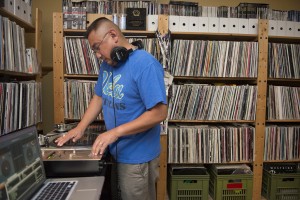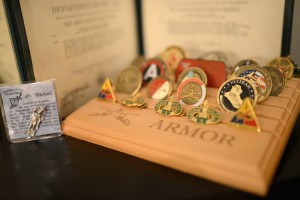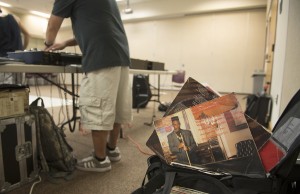He started at UCLA 28 years ago as a teenager from a poor part of Los Angeles, a former gang member who had seen his friends fall to gunshots and knives while still in high school.
Last week, Jose Buktaw finished his final class at UCLA. He graduated as a war veteran who had joined the military to “hit the reset button” on his life.
Fighting in two wars, Buktaw once again seen his comrades die, this time to shrapnel and rocket grenades.
Much of Buktaw’s life has been about starting over – finishing what he began and securing a good life for his family of eight.
“It’s up to people. There’s things you can affect and things you can’t,” Buktaw said. “From what I learned … you have the power to make a difference and make it better. It’s cliché, but things don’t change overnight.”
At 45 years old, earning his UCLA degree was just the next step in turning his life around.
Buktaw was a sophomore in high school when he joined a gang, what he calls the “neighborhood,” trying to find a sense of dignity and respect.
He was Filipino and growing up in Los Angeles at the tail end of the Vietnam War.
When he was only in the third grade, a teacher had told him that Asians, like him, don’t value human life.
Buktaw said he got tired of the jumpings and the name-calling he endured from his peers, so he went to the “neighborhood” to combat the harassment.
“(In the ‘neighborhood’), we weren’t perceived as being weak or inferior,” Buktaw said. “We held our own. It’s a bad thing in a way, but a good thing in a little way.”
Gangs’ weapons of choice grew more deadly over time. First it was fists. Next it was chains. Then knives. Then guns.
Several of Buktaw’s friends died or went to prison.
The “neighborhood” was dangerous, but it was still a way they could share a sense of dignity, respect and brotherhood – things Buktaw said he didn’t have as a Filipino boy in a poor part of Los Angeles.
It was hip-hop that helped bring Buktaw out of the “neighborhood” – not the commercial hip-hop of today, but a more old-school hip-hop, with spinning turntables and B-boying, popping and locking competitions.

Every other weekend, Buktaw hauls out his own DJ table and records to hold hip- hop workshops and sessions for local youth at a church.
Buktaw, a quiet, man who taps his hand and pauses when he speaks, has DJed at premier hip-hop events in New York, Tokyo, Seattle, Toronto, Washington, D.C. and Orlando, Fla.
Melvin Racelis, who helps Buktaw hold these workshops, said he never would have guessed by looking at him that Buktaw had been through so much.
“He’s so soft-spoken and humble,” Racelis said. “You wouldn’t tell he’s done a lot of big things.”
In his home, Buktaw keeps about two dozen military certificates and service medals neatly displayed on a bookshelf by the front door. Most visitors, however, just walk past them.

He fought in the Persian Gulf War, then was called back twice in 2005 and 2007 to serve in the war in Iraq.
Some of the soldiers he met joined the military because they were patriotic.
But most were like Buktaw, just trying to find a new life. Some were ex-gang members like him, and others were young men with families. Many were from low-income backgrounds simply looking for work so they could send money home.
They went out on missions for two to three weeks at a time without a clear measure of success. For Buktaw, fighting became not about destroying the enemy, but about protecting his “brothers” from harm.
His last day serving in the field came while he and his fellow soldiers were inspecting an apartment building for enemy units and were attacked.
Buktaw jumped out of the building’s second story just as a rocket smashed through the apartment wall.
The fall demolished his lower legs. Medical personnel reconfigured his mass of tendons and ligaments with screws and plates in four surgeries. The surfing, snowboarding, biking and B-boying he used to do became things of the past.
Today, Buktaw regularly attends sessions for physical therapy, speech pathology, occupational therapy and counseling for post-traumatic stress disorder.
He said he expects to receive such therapies for the rest of his life.
“It could’ve been worse,” he said. “I could’ve lost my legs. I’m thankful I still have my legs.”
Buktaw first enrolled at UCLA in 1985, and then again in 1995, but left the next year because he couldn’t afford it and had to work instead.

He wants to continue the kind of work he did before he went to Iraq, when he helped provide social services to low-income families and at-risk youth – people who were in his same shoes.
“Teachers write a lot of (at-risk) youth off,” Buktaw said. “But they all want the same things: a decent house and being able to provide for your family. … It was easier for me to relate to the youth. They know my background.”
To finally finish his degrees in history and political science, Buktaw took classes every quarter – including summer sessions – since January 2011.
He said he knew he wouldn’t be able to get a good-paying job to help his family unless he completed college first.
“I went back to school to finish what I set out to do … for my family’s sake and my sake,” Buktaw said.
Because of his war injuries, he walked around campus using a cane and carried his textbooks in a military pack, which he said is better designed for the pain in his back.
Injuries to his brain from warfare caused him to take twice as long as he used to finish the same amount of schoolwork.
“It’s been pretty exhausting,” he said. “I’m pretty worn out.”
He still found time despite his class schedule to be a caring father at home, said Felicita Buktaw, Jose’s wife.
He helps some of his five stepchildren with their homework, drops them off at school and shops for groceries. He teaches his 1 1/2-year-old son, JJ, how to B-boy.
“He always takes family first before himself, and that’s why I fell in love with him,” Felicita Buktaw said.
But after nearly three decades of working to finish college, Buktaw said he is still not done with school.
He hopes to enroll at the UCLA Luskin School of Public Affairs for a master’s degree in social welfare or public policy, which he said is his next step in securing a good job for his family’s benefit.
Buktaw said he doesn’t know yet how he’ll pay for graduate school.
His education benefits from serving in the military are running out, and he currently supports his family with a mixture of pension, disability allowance and a small living allowance for his rented house in Chino Hills, Calif. But groceries alone cost his family $1,000 a month.
He said he hopes fellowships, grants or scholarships will come through and help pay for his tuition.
For now, he’s looking for work in the social welfare area – somewhere he can help men and women from low-income neighborhoods, at-risk youth and veterans healing after years of war.
People he might call his “brothers.”

Congratulations fellow class of 2013er! I was privileged to study alongside Jose in a history seminar this last year, and although we didn’t get to speak much outside of class, Jose, hearing more of your story through this article is a great inspiration to me, as I’m sure it is to many others as well. Best of luck for the future!
What an inspirational story.
Hey Jose, I hope you didn’t get brainwashed by the Leftist professors during your time at UCLA. Those a$$holes support the Muslim terrorists that you so valiantly fought.